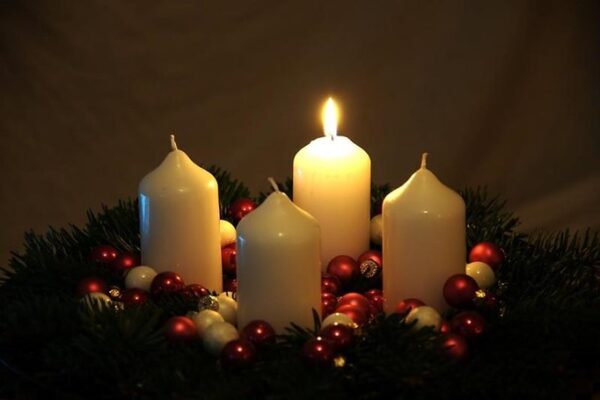As we enter December and approach the darkest nights of the year, let us turn towards each other. In anticipation of my first holiday season with Westside, I look forward to the many opportunities we’ll have to be present with each other in both celebration and the complexity that comes with these days.
In conversations with staff, worship leaders, and other community members, I am beginning to understand that this congregation has a lot of diversity in our relationship to this season and what practices are most meaningful for us. As we move through this time, I invite you to pay attention to what traditions–old, and new–have special resonance for you. What stories and rituals speak to you? And where is there tenderness or even grief bubbling up? What support are you needing?
In an experiment with making meaning out of old traditions, I plan to write a short reflection for each week of Advent, beginning with this post. As always, feedback & conversation is welcome, if these reflections spark anything for you. In the Christian tradition, Advent is a period of time when we can prepare ourselves spiritually for Christmas, as it approaches. We take time to slowly and deliberately live into the themes of this season, starting with Hope, which happens to be Westside’s worship theme for this December.
Advent Week 1: Hope
For a time in grad school, I worked for author Frances Moore Lappé, of Diet for a Small Planet and Daring Democracy fame. In professional bios, she describes herself first and foremost as a “hope monger” and I learned from her the power of this stance. In her book Hope’s Edge, she traveled around the world learning from leaders who acted on their big imaginations to make the world a better place, and who were making a measurable difference in their communities. In her search for hope, she learned that hope is not something that we can feel by looking objectively at a situation and predicting a good outcome. Instead it requires engagement in the world, in community, and committing oneself to creating new possibilities. She concluded:
“Hope is not what we find in evidence; it is what we become in action.”
Since learning this from Frankie, I have understood the importance of hope as a practice, not simply a spontaneous sentiment. As spiritual people who long for a world full of justice, peace, and the wellbeing of all, it is vital that we actively cultivate hope. For the time that we asked our chalice lighters “what brings you hope?” In this community, we have a rigorous practice of hope, and I know that this strengthens us in all we do.
And, let’s be real. Hope is not always this rosy intellectual thing. Sometimes, hope is the desperate way we get through times of struggle. Not seeing the way things can possibly turn out well, but doing everything we can do to carve a real future anyway. In the past few years, I have been called to the kind of hope that author Rebecca Solnit describes:
“Hope is not a lottery ticket you can sit on the sofa and clutch, feeling lucky. It is an axe you break down doors with in an emergency. Hope should shove you out the door, because it will take everything you have to steer the future away from endless war, from the annihilation of the earth’s treasures and the grinding down of the poor and marginal… To hope is to give yourself to the future – and that commitment to the future is what makes the present inhabitable.”
So, in this season, in this year, what kind of hope are you reaching for? How are you giving yourself to the future? In these times of wars, pandemics, extreme economic inequality, climate crisis, loneliness, and social divide, hope is the tool we have to create a better someday, to strengthen each other.
May the warmth of our celebrations in this season remind us and fuel us to Hope.
And, a song that embodies hope for me: “Tomorrow” by Miner. Amidst a flood of difficulty, it’s an insistence on better days to come.

